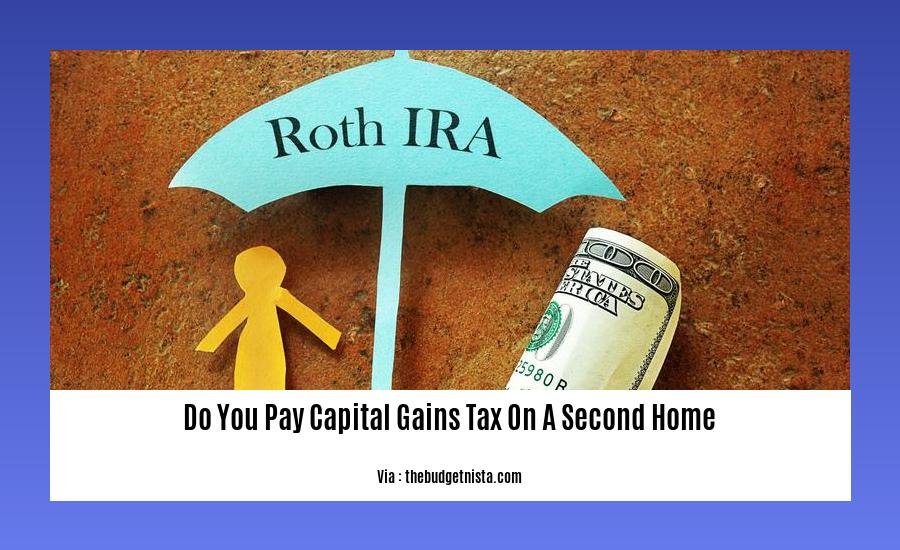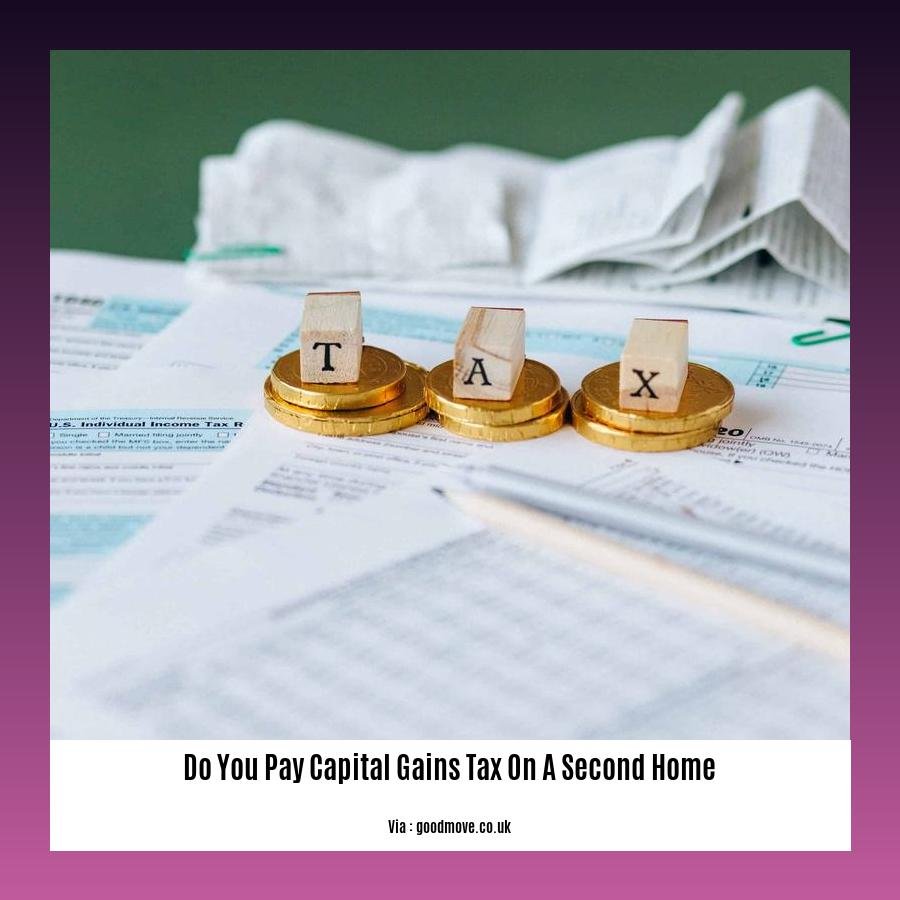Discover the intricacies of capital gains tax implications when selling a second home in our comprehensive guide, “Do You Pay Capital Gains Tax on a Second Home? Essential Considerations for Real Estate Investors.” Delve into the nuances of tax laws, exemptions, and strategies to minimize tax liability. Equip yourself with the knowledge to navigate the complexities of real estate investments and make informed decisions.
Key Takeaways:
-
Capital gains tax (CGT) applies to profits made from selling second homes.
-
Sellers must pay CGT to HMRC regardless of how the profit is made.
-
CGT is levied on the gain, not the total amount received from the sale.
-
Selling your main residence may qualify for reliefs and eliminate CGT.
-
CGT rules and rates vary depending on personal circumstances and property ownership.
Do You Pay Capital Gains Tax on a Second Home?

Navigating the complexities of capital gains tax (CGT) when selling a second home is crucial for real estate investors. Do you pay capital gains tax on a second home? The answer is generally yes, unless specific exemptions or reliefs apply.
Understanding Capital Gains Tax
CGT is a tax levied on the profit or gain made when you sell an asset, in this case, a second home. It’s calculated as the difference between the sale price and the original purchase price, plus any additional costs incurred during ownership, such as renovations or improvements.
CGT Rates and Allowances
The CGT rate you pay depends on your individual circumstances and property ownership. In the UK, the rates for residential properties range from 18% to 28%. However, there are personal allowances that can reduce or eliminate your tax liability. As of April 2023, the annual CGT allowance is £12,300.
Principal Private Residence Relief
One key exemption to CGT is the principal private residence relief. If you sell your main home, you won’t pay CGT on the gain, regardless of how much it is. This relief is automatic and applies to UK residents.
Lettings Relief
If you let out your second home, you may be eligible for lettings relief. This relief reduces the amount of CGT you pay on the gain by a percentage, depending on the number of years you rented out the property.
Other Reliefs and Exemptions
There are other reliefs and exemptions that may apply to the sale of a second home, such as the final-period exemption, which exempts gains made in the last nine months of ownership. It’s important to consult with a tax advisor to determine if you qualify for any of these reliefs.
Steps to Minimize CGT Liability
- Maximize Allowances: Ensure you utilize your annual CGT allowance and any other relevant allowances to reduce your tax liability.
- Long-Term Ownership: Holding onto your second home for a longer period can reduce your CGT liability as you may benefit from lower tax rates.
- Principal Private Residence Relief: If possible, designate your second home as your principal private residence to avoid CGT altogether.
- Record Keeping: Keep detailed records of all costs associated with the property, including purchase price, renovation expenses, and selling costs.
Navigating CGT implications on a second home requires careful consideration of various factors. Consulting with a tax advisor can help ensure you understand your obligations and minimize your tax liability.
Do you pay council tax on a park home? Find easy-to-understand answers and gain insights into the complexities of council tax regulations for park homes.
Do you pay council tax on park homes? Get clarity on the council tax implications and obligations associated with owning a park home.
Does California have homestead exemption? Uncover the homestead exemption laws in California and explore how they can provide significant property tax relief to homeowners.
Does Eufy work with Google Home? Discover the compatibility between Eufy smart home devices and Google Home, unlocking seamless voice control and automation possibilities.
Do You Pay Capital Gains Tax on Your Second Home?

Selling a second home can be a complex process, especially when it comes to taxation. Navigating the intricacies of capital gains tax on second homes requires careful consideration and an understanding of the relevant rules and regulations. Let’s delve into the tax implications of selling a second home, addressing common concerns and providing essential information for real estate investors.
Key Takeaways:
- Disposing of a second home may have capital gains tax implications.
- Capital gains from the sale are taxed, not the total proceeds.
- Check your country’s specific laws; tax rates and regulations can vary.
- Exclusions and reliefs can minimize or eliminate tax liability.
- Professional guidance can ensure compliance and potential tax savings.
Understanding Capital Gains Tax on Second Homes
The basic principle of capital gains tax on second homes is that when you sell your property for a profit, you are liable to pay tax on the gain. This tax is generally calculated based on the difference between the sale price and the original purchase price, factoring in any allowable expenses associated with acquiring and improving the property.
Rates and Allowances
The rates and allowances for capital gains tax on second homes can vary depending on individual circumstances, including location and applicable tax laws. It’s crucial to stay updated on the specific rules within your jurisdiction to ensure compliance.
Exclusions and Reliefs
In some cases, exclusions and reliefs may be available to reduce or eliminate capital gains tax liability on second homes. For instance, some countries offer primary residence exemptions for principal private residences, excluding them from capital gains taxation. It’s important to research available exemptions and reliefs to maximize tax savings.
Seeking Professional Guidance
Navigating the intricacies of capital gains tax on second homes can be challenging. Engaging a qualified tax professional or real estate expert can be invaluable. They can help you accurately calculate the capital gains tax liability, identify and apply applicable exemptions, and strategize to minimize tax exposure.
Conclusion
Understanding and planning for capital gains tax implications is essential for real estate investors dealing with the sale of a second home. By staying informed about tax regulations, considering available exclusions and reliefs, and seeking professional guidance, investors can navigate the tax landscape effectively, making informed decisions that optimize their financial outcomes.
References
[1] Capital Gains Tax on Second Homes in the UK
[2] How to Avoid Capital Gains Tax on Second Homes
FAQ
Q1: Do I need to pay capital gains tax when selling my second home in the UK?
A1: Yes, capital gains tax (CGT) is applicable when you sell your second home in the UK, regardless of whether you made a profit or not. The amount of CGT you owe depends on various factors, including the gain made from the sale, your tax bracket, and any available reliefs or allowances.
Q2: How is capital gains tax calculated on the sale of a second home?
A2: CGT is charged on the gain made from the sale of your second home, which is the difference between the sale price and the purchase price (adjusted for certain costs and expenses). Your personal CGT rate will determine the tax amount you owe, which ranges from 10% to 28% depending on your income and other factors.
Q3: Are there any exemptions or reliefs available to reduce my capital gains tax liability on a second home sale?
A3: Yes, there are several reliefs and exemptions that can help reduce your CGT liability when selling a second home. These may include the principal private residence relief, the lettings relief, and the annual CGT allowance. Consulting with a tax advisor or accountant can help you understand which reliefs apply to your specific situation.
Q4: What happens if I gift or exchange my second home instead of selling it?
A4: Gifting or exchanging your second home is still considered a disposal for capital gains tax purposes, and you are liable to pay CGT on any gain made. The same CGT rates and allowances apply, and you must report the transaction to HMRC. However, there may be inheritance tax implications to consider if you gift your second home, so seeking professional advice is recommended.
Q5: How can I minimize my capital gains tax liability when selling my second home?
A5: There are several strategies to minimize your CGT liability when selling your second home. These may include offsetting the gain against any allowable losses, utilizing available reliefs and exemptions, considering the timing of the sale, and potentially structuring the sale in a tax-efficient manner. Consulting with a tax advisor or accountant can help you develop a personalized strategy to reduce your CGT liability.
- Upgrade Your Table Setting: Best Salad Forks 2025 - June 26, 2025
- Sage Green Throw Pillows: Transform Your Home Decor - June 26, 2025
- Find the Perfect Sage Green Rug: A Buyer’s Guide - June 26, 2025










